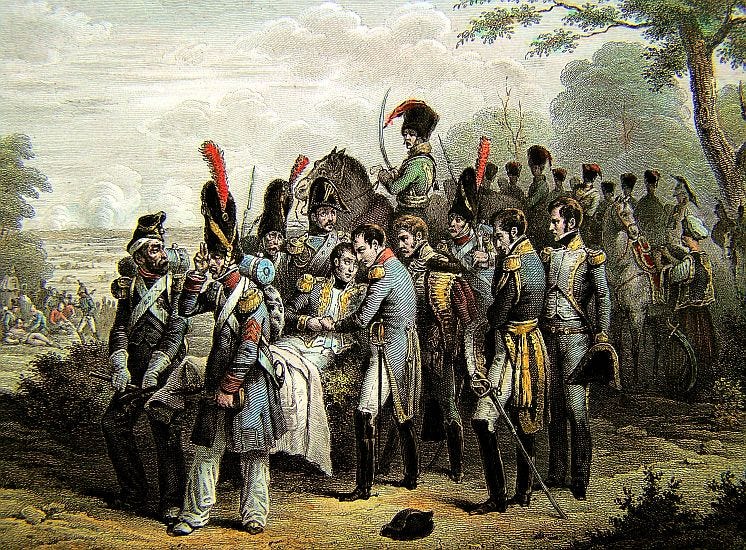Napoleon at Aspern
An Excerpt from Anecdotes by Heinrich von Kleist
The following is an anecdote written by Heinrich von Kleist for his daily newspaper, the Berliner Abendblätter, which appears in the collection, Anecdotes, translated by me and published last year through Sublunary Editions. Though privately an enemy of Napoleon of the French Empire, Kleist was obliged by government censorship to be evenhanded and uncontroversial in political matters. And while he did adhere to the letter of the law, at least for a while, this did not stop him from writing graphic satire.
From a work entitled, A Sojourn with the Army in the Year 1809. Hofbuchandlung, Rudolstadt. A Frenchman tells the following anecdote of Napoleon in 1810, a curious example of him being moved toward vivid feelings of compassion. It is known that, at the Battle of Aspern, the selfsame man, deeply touched, held the stricken General Lannes for a long while in his arms. On the evening of that very battle, in the midst of grapeshot volleys, he observed an attack by his cavalry; a host of wounded men lay about him—silent, eyewitnesses of the incident report, so as not to burden the Emperor with their complaints. Then an entire French cuirassier regiment, evading a superior force, overruns the unfortunate crowd; loud cries of misery erupt, mixed with exclamations of “Vive l’Empereur! Vive l’Emperuer!” the latter somewhat drowning out the former. Napoleon turns about, and only by placing a hand in front of his face can he, with great force of effort, tears streaming, keep his composure.
Aspern-Essling was a major battle held in the outskirts of Vienna, on the banks of the Danube, between the French and Austrian Empires, taking place on May 21st–22nd, 1809. It was the first time Napoleon had suffered personal defeat in over a decade. On a purely military level, the Austrian victory was indecisive. Both sides suffered tremendous losses. But for purposes of morale and propaganda, it was a crucial engagement. Kleist wrote a poem dedicated to the principal Austrian commander Archduke Charles, hailing him as the “conqueror of the unconquerable.” Aspern, along with continued fighting in Spain, signaled a decline in French military power under Napoleon.
The short anecdote, derived from secondary sources, belies Kleist’s firsthand experience of the event. Since outbreak of the war between Austria and France earlier that spring, his various friends and associates in Dresden, where Kleist was living at the time, had scattered, seeking administrative and military positions in various German governments, to help, at least indirectly, with the war effort against France. Kleist himself undertook a trip to Vienna, on foot, for reasons he admitted were unclear. In his absence, rumors spread that he had gone insane, had killed himself, or was doing intelligence work for the Prussian state. Accompanying Kleist was a young translator and historian, Christoph Dahlmann. By all accounts, the two got along very well. They discussed rhetoric and traded critiques of each other’s work as they travelled. The company might have been more than intellectually stimulating. Dahlmann remarked, years later, that he and Kleist were inseparable, “like a married couple,” and the two shared a joint passport.
Much like Kleist’s own work, the trip to Vienna produced a number of grimly comic episodes. On the road, he and Dahlmann fell in with a party of Prussian army officers, dispatched for secret negotiations with the Austrian government. Their presence proved to be major irritant to the leader of the delegation, Colonel Karl Friedrich von dem Knesebeck. Kleist and Dahlmann had become obsessed with Kreigsspiel, a sort of primitive table top military strategy game, played on a map with movable pieces representing two opposing armies. Kleist and Dahlmann’s habitual play eventually resulted in a shouting match between them and Knesebeck. The game could be used, so Kleist argued, to teach principles of military theory. “The devil take them,” was Knesebeck’s reply. The situation took a dangerous turn when Kleist, frequently careless with firearms, left a loaded brace of pistols in the dining room of an inn. An officer, unaware that the guns were loaded, picked one up, causing it to discharge. The bullet grazed the temple of Dahlmann. “Thank God you’re not hit,” cried the horrified officer. Knesebeck, also present, replied, “But damnation, I am!” and presented them his shoulder, where the stray bullet had lodged itself.
Kleist and Dahlmann continued towards Vienna, without Knesebeck, who was forced to go to Prague for medical treatment. On the morning of May 22nd, in the village of Stockerau, a morning game of Kriegsspiel was interrupted by the innkeeper, who informed the pair that a battle, an actual battle, was underway in the vicinity. Kleist summited a hill overlooking the Danube and witnessed the chaotic action unfold, from a comfortable distance. The following day, he and Dahlmann borrowed a carriage from the innkeeper and drove out to inspect the battlefield more closely. The two spotted a peasant collecting bullets and asked him for possible ways to cross the Danube. Hearing their strange accents, the peasant mistook them for spies or retreating French soldiers, and the Kleist and Dahlmann found themselves surrounded by hostile Austrian troops. To Dahlmann’s amusement and horror, Kleist began circulating copies of his anti-French poems as proof of his identity and good intent. The pair were taken to military headquarters, interrogated, and might have been shot or imprisoned if not for Kleist’s pedigree. Their captors asked him about his relation to various illustrious generals bearing the family name. He and Dahlmann were eventually released, and Kleist went on to Prague. Almost nothing is known about his activities there
A FINANCIAL APPEAL: If you would like to support my translations and original writing, please consider a paid subscription to this newsletter, Paradise Almanac, and/or buying a copy of Anecdotes, which is available direct through its fine publisher, Sublunary Editions.


